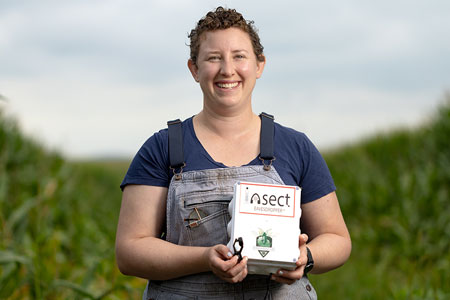| Meet the University of Wisconsin-Madison’s Emily Bick Assistant Professor of Entomology |
 |
Research area Applied agroecology, digital entomology (through modeling and technology) and spatial population biology. The Original Digital Entomology Lab’s research goal is to develop tools and strategies that support data-driven precision management practices.
What excites you about your work?
“Agriculture and entomology are missing the incorporation of computer science–we have data analysis but don’t have a way to accessibly hand out data-driven tools to make farming more sustainable for growers, extension educators, crop consultants and agritech companies. Insects move more than most other organisms in the field, and it’s labor intensive to check what’s going on in the field frequently. I’m hoping to make entomology more accessible and bring Big Data into decision making for stakeholders.”
What do you hope to achieve?
“In the field of agriculture, we lose, on average, 20% of crops to insect pests. Occasionally, we get a plague of pests that destroys 75-100% of fields. We need to know when that’s happening–we need better data to help inform better decision making. Current practices often treat insecticide as an insurance policy, which leads to resistance from overusing our chemical tools and not having access to newer ones. I’m hoping to be able to provide a cost-effective, skilled labor-free experience for farmers, so they can put out sensors, in complement to scouting fields, and get better pest information, which leads to data-driven pest responses. This could impact global food security and lead to more sustainable, more economical farming. My lab is making cost-effective sensors, which includes the development of a technology called the ‘Insect Eavesdropper.’ The sensor uses an inexpensive, clip-on guitar microphone to hear when insects are feeding on leaves, boring down stalks, or chewing on the rootzone and incorporates machine learning algorithms to identify the insects and warn the grower.”
When Prof. Bick came to campus, she hit the ground running and connected with the experts in the crops that stand to benefit the most from her ideas. Her data-driven tools can help farmers protect their valuable crops from insects and allow for more targeted chemical use. We are thrilled to continue working with Emily as she strives to apply cutting-edge solutions to major global challenges.
– Emily Bauer, WARF, Director of Licensing
Want to learn more?
Emily Bauer, [email protected], 608.960.9842